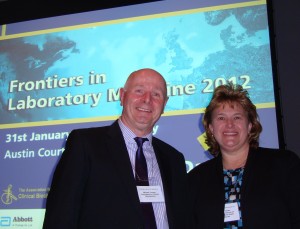Frontiers in Laboratory Medicine (FiLM) attracted another record crowd of clinical laboratory managers and pathologists
DATELINE—BIRMINGHAM, ENGLAND: Healthcare in the United Kingdom is undergoing a host of reforms. Consequently, medical laboratories in this country are scrambling to evolve in ways that allow them to serve the new line-up of primary care trusts and hospital trusts, even as payment for pathology testing services must be negotiated with commissioning bodies.
The many changes unfolding within the National Health Service (NHS) helped to attract a record crowd to the 10th Annual Frontiers in Laboratory Medicine (FiLM), which was conducted in Birmingham, England. For the second year in a row, this conference was sold out.
Helping Physicians and Payers Recognize the Value of Pathology Testing
The theme on day one of FiLM will be familiar to all clinical laboratory managers, clinical biochemists, and pathologists working in developed nations around the world. It was how to get physicians and health system executives to recognize the substantial value of clinical pathology laboratory testing and link that value to adequate funding for medical laboratory testing services.
This is an urgent issue for labs in the United Kingdom. That is because the National Health Service is having primary care trusts and certain other healthcare bodies use commissioning to solicit bids from medical laboratories (usually based in nearby hospitals) that want to compete for those lab test referrals.

At Frontiers in Laboratory Medicine (FiLM) in Birmingham, England, on Tuesday, January 31, 2012. Pictured here Michael Thomas, President of the Association for Clinical Biochemistry and Jean Hammalev, Executive Director, Program Office & Quality, Sonora Quest Laboratory Services/Laboratory Services of Arizona. Hammalev spoke about patient-centered care and the improvement projects her medical laboratory has implemented to raise the quality and consistency of patient care.
This commissioning process introduces a new element of risk and opportunity to the clinical laboratory profession. It means that hospital laboratories—which traditionally provided medical lab testing to the general practice (GP) clinics, must now respond to tenders from the primary care trusts and negotiate a contract to gain access to these patients.
During one session on Tuesday afternoon, three speakers tackled this topic:
- Stuart Smellie is the Consultant Chemical Pathologist in the County Dunham and Darlington NHS Foundation Trust and the Head of the South Durham Laboratories in the UK. Smellie outlined the need to improve how primary care physicians order medical lab tests. He pointed out how better utilization of lab tests would contribute to improve patient outcomes. Further, he identified ways that laboratory scientists could step up and provide useful consultative support to physicians. He recommended that labs in the United Kingdom should get recognition for these contributions when negotiating with the commissioners of primary care trusts.
- James Crawford, M.D., Ph.D., is Chair of Pathology and Laboratory Medicine at North Shore Long Island Jewish Health in Manhasset, New York. The United States has the same challenge of linking the substantial value of clinical laboratory testing to the amount of money that health insurance programs will pay for lab testing. Crawford presented the Medical Home model of integrated patient care. More specifically, Crawford described five specific ways that medical laboratories can add value to the physician, the patient, and the payer. He emphasized that “the laboratory is first to see 80% of the typical patient’s information” and this creates the opportunity for the lab to provide useful consulting input to referring physicians.
- Hemai Desai, M.D., is a practicing General Practitioner and is Clinical Advisor to the Strategic Projects Team at NHS Midlands and East. He is also Co-Leader of the Transforming Pathology Services program in the East of England. In these roles, Desai is engaged in commissioning activities. Desai recommended that pathology laboratories in the UK work collaboratively during negotiations with commissioners. The common goal is to improve utilization of medical laboratory testing that directly contributes to improved patient outcomes and an overall lower cost per episode of care.
FiLM is unique in that it is the United Kingdom’s largest and longest-running meeting that identifies useful advances in the management and operation of pathology laboratories. It brings together the first-mover and early-adopter lab leaders who share their experience at creating pathology networks, using new lab automation technology, and dealing with the changes now unfolding within the National Health Service.
Medical Laboratory Speakers from North America at FiLM
Another aspect of FiLM that makes it unique is that it presents speakers from innovative medical laboratories in North America. This allows the FiLM delegates to learn about breakthroughs in pathology laboratory management in the United States and Canada that can be adopted and applied by pathology laboratories in the United Kingdom.
One common insight shared by the speakers at day one of FiLM is that pathology laboratories must not shy away from educating physicians and government health program policymakers about the high-value role that medical laboratory testing provides. If they fail in this effort, it makes it easier for government health programs to use “lowest price” as the basis for establishing lab budgets and setting reimbursement levels for medical laboratory testing services.
From Austin Court Conference Centre in Birmingham, England,
Your Dark Daily Editor,
Robert L. Michel
Email: rmichel@darkreport.com
Related Information:
Frontiers in Laboratory Medicine, Programme, Speakers, and Agenda
British Health Service Budget Cuts Mean Less Funding for Pathology Laboratories
Clinical Laboratory Innovators Gathering for “Frontiers in Laboratory Medicine 2010”



